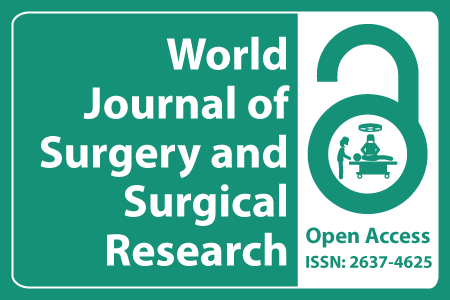
Journal Basic Info
- Impact Factor: 1.989**
- H-Index: 6
- ISSN: 2637-4625
- DOI: 10.25107/2637-4625
Major Scope
- Breast Surgery
- Vascular Surgery
- Neurological Surgery
- Pediatric Surgery
- Oral & Maxillofacial Surgery
- Endocrine Surgery
- Ophthalmology & Eye Surgery
- Surgical Oncology
Abstract
Citation: World J Surg Surg Res. 2023;6(1):1480.DOI: 10.25107/2637-4625.1480
Rare Doxycycline Antibiotic Therapy Induced Cholelithiasis: A Case Report
Satyam S, Natasha H and Chhaya S
Department of Clinical Pharmacy and Clinical Pharmacology, Fortis Hospital, India
School of Medicine, St. George’s University, Grenada
*Correspondance to: Satyam Suman
PDF Full Text Case Report | Open Access
Abstract:
Patient information: A 61-year-old female patient presented with a complaint of heartburn, bloating and belching for the past month. Upon examination, no abnormalities were noted, and the patient did not have any pre-existing chronic diseases or metabolic abnormalities. During the assessment of the patient's medical history, it was revealed that she had been taking doxycycline 100 mg twice daily for the management of skin pruritus for the past two months.
Clinical findings: The patient's cardiovascular and respiratory systems showed no abnormalities, and the abdomen was soft and non-tender. A chest X-ray performed a month prior showed basolateral fibrosis without severe lung parenchymal damage with low voltage sinus rhythm and atrial fibrillation in ECG (Electrocardiogram). Ultrasonography of the abdomen revealed the presence of two calculi in the gall bladder, indicative of cholelithiasis. Other organs, including the liver, spleen, pancreas, urinary bladder, and kidneys, appeared normal in shape, size, and echotexture. Pathological findings showed total protein levels of 6.38 g/dL, an AST: ALT ratio of 1.02, a platelet count of 112 thou/μL, a lymphocyte percentage of 43.30%, and an absolute basophil count of 0.01 thou/μL.
Follow-up and Outcomes: Considering the patient's clinical history, investigations, and findings, the diagnosis of doxycycline-induced cholelithiasis was made. The patient underwent surgical management, specifically laparoscopic cholecystectomy, which was performed two days after admission and one month after the onset of symptoms. This case report does not provide specific information regarding the postoperative or long-term outcomes of the patient.
Keywords:
Liver toxicity; Overdose; Side-effect; Adverse event
Cite the Article:
Satyam S, Natasha H, Chhaya S. Rare Doxycycline Antibiotic Therapy Induced Cholelithiasis: A Case Report. World J Surg Surgical Res. 2023; 6: 1480..













